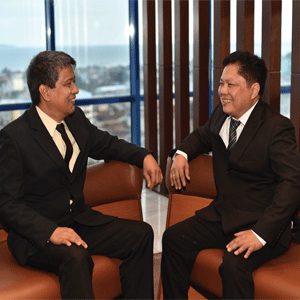
From the time the Association of Southeast Asian Nations (ASEAN) was established over four decades ago, the Southeast Asian region has experienced waves of rapid changes, especially when countries moved towards greater liberalization in their socioeconomic activities and closer interdependence regionally and globally. Within this context, domestic and global forces have significantly transformed the region’s higher education sector. The changing landscape in higher education is chiefly characterized by massification, diversification, marketization, and internationalization. The increase in demands for higher education has manifested in three forms—a larger student population, higher interest in cross-border knowledge and experience, and the need for more academic programs.
Higher education restructuring in a number of Southeast Asian countries has led to the establishment of autonomous and other forms of higher education institutions. The Ateneo de Davao University - School of Engineering and Architecture was founded in 1978 in response to the growing needs of the time. The school believes in architecture as an Art & Science of buildings, especially for human habitation.
The Ateneo de Davao University's mission is to foster excellence and wield a passion for learning through comprehensive instruction rooted in the Ignatian spirit while also providing the right environment for industry-relevant research and community service carried out in the Filipino Christian tradition. By providing continuous professional development, the University invests in teacher training and development.
This allows professors to stay up to date on best practices and improve their teaching abilities. Regularly assessing student learning is also important because it helps teachers understand what students know and where they need extra help. Finally, project-based and hands-on learning experiences can help develop critical thinking and problem-solving skills.
Redesigning the Creative Path
Ateneo de Davao University first offered architecture in 1998. Since then, the Atenean learning experience - spiritual, sociocultural, intellectual, and physical, has been integrated into the architecture curriculum. These core values enabled the university to produce graduates who are not only technically prepared, but also anchored in the core principle of being men and women for others. Graduates have developed leadership skills that has had a significant impact not only on their profession or workplace but also in the community.
To achieve the programme outcomes, Ateneo De Davao University adheres to, and even exceeds, the minimum requirements set by the country's governing bodies for architecture education. The university strictly observes curriculum delivery and teaching methods, and it maintains necessary facilities such as library (and an e-library), drafting studios, and other laboratories. "The architecture programme encourages students to participate in non-academic activities, such as industry immersion through workshops and seminars related to the discipline. Although the apprenticeship programme is a post-baccalaureate activity for students, the Architecture Department provides on-the-job diversified training. This is done to get them ready for studentemployer interviews and to connect them with potential employers", shares Dr. Randell U. Espina, Dean.
Learning at home is no longer an issue with the introduction of HISFlex classrooms at the Ateneo de Davao University, a cutting-edge classroom capable of incorporating online and face-to-face teaching. The use of a Learning Management System (LMS) as well as modern-day teaching and learning strategies is greatly supported.
Creating a Framework of Student Empowerment
With backgrounds in project management, Building Information Management (BIM), tropical design, culture and heritage preservation, and urban design and planning, Ateneo de Davao's faculty members have a diverse range of professional experiences. Students are expected to learn the best practices in the industry by matching the subject to the experiences of the faculty, which they will then apply to their respective works when they become architects. Ateneo has consistently supported its faculty by providing financial assistance through the Faculty Development Fund. It enables the faculty to complete their graduate studies in architecture at reputable universities both locally and abroad. "Ateneo also provides support for faculty to attend local and international conferences aimed at improving learning instructions and providing quality education to their students", shares Ar. Wilfredo Z. Policarpio, Chairperson, Architecture Department.
To achieve the programme outcomes, Ateneo De Davao University adheres to and even exceeds the minimum requirements set by the country's governing bodies for architecture education
Scholarship programmes enable students to complete and achieve their higher education goals. It alleviates students' financial concerns, improves study habits and memory retention, and increases their chances of pursuing graduate studies. Many of the university's scholarship opportunities are merit-based or awarded as recognition for one's achievements, with the financial background taken into account.
The Architecture programme at Ateneo de Davao University aims to be the region's centre of excellence in the field of architecture. It continues to strengthen its faculty development programmes and eventually offer post-graduate degrees in architecture and related degrees.
Dr. Randell U. Espina, Dean, AdDU SEA
Dr. Randell Espina is an Electronics and Electrical Engineer with a Master's Degree in Systems Engineering & a Ph.D. in Education Management & Doctor of Engineering. He is a full-fledged professor and currently the Dean of the School of Engineering and Architecture of the Ateneo de Davao University. He is the lead researcher on renewable energy technologies at the University.
Ar. Wilfredo Z. Policarpio, Chairperson, Architecture Department
Wilfredo Z. Policarpio is an accomplished architect and designer with over 18 years of experience in the field. He is the Chairperson at Ateneo de Davao University, where he imparts his knowledge and expertise to aspiring architects. Wilfredo obtained his Bachelor of Architecture degree from Adamson University and later completed a Diploma in Urban and Regional Planning from the University of the Philippines- Mindanao.
We use cookies to ensure you get the best experience on our website. Read more...